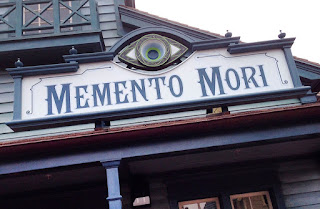That's okay, I didn't either.
I just thought everything I went through was normal. I thought everybody was like this, that everybody experienced things the same way I did. Because when you hear "you're fine, don't be so dramatic" enough times, eventually you just figure those people are right, and you stop trusting your own perceptions of reality.
It's only been in the last year that I've started to discover that many of the ways in which I process the world are very different from the norm.
As far as touch is concerned, I've always known that I'm very sensitive to textures and to irritation of the skin. I sunburn even with high SPF sunblock on. As I mentioned in my previous post, tags on clothing drive me bonkers, and autumn is my favorite time of year for clothing because everything is soft and I can snuggle into scarves and sweaters and soft, heavy socks. My first requirement for new clothes is texture; if they don't immediately feel soothing to the touch, I move on. I am soothed by touching soft fabrics or my cats' fur, and I often carry a worry stone in my pocket because it calms me. But bad textures or touches can set my teeth on edge; if I get the edges of my long sleeves wet when I wash my hands, those little damp spots on my wrists will drive me up a wall and distract me from whatever it is I'm supposed to be doing.
I don't have a ton of issues with smell or taste, though I do tend to prefer my food a bit blander than the average person, and if a food's texture is "off," I can't eat it. I actually like the taste of mushrooms, but can only eat them fried or this one way my mom stuffed them, because otherwise they feel slimy in my mouth and I gag. I do have a visceral reaction to that "fishy" flavor that anything but super-fresh fish tastes and smells like, though I like shrimp and scallops and stuff that comes in shells, because it doesn't get that flavor as much. But I can't typically make myself swallow food that once had fins. Sushi is right out, and the texture of eel nearly made me cough my brains out once upon a time, because I couldn't get the image and feel out of my head that I had chewed on a severed human tongue.
I DO have major issues with sound and sight. ADHD and autism share similarities in sound processing, so some of you might recognize some of yourself in this, but with sound, everything around me just blends together in terms of importance and priority. You know how, when you're driving and trying to find a new place, or listening to directions, or looking for a parking spot, and you turn your radio down? Why do you do that? Theoretically you shouldn't need your ears to look for your destination, but the sound pulls at your attention and requires processing power in your brain. For me, it's like that all the time, except I can
never turn the world's noise down. The air conditioning kicking on is just as loud and important to my brain in terms of input as the important message you've just imparted to me; I don't WANT that to be the case, and I'm TRYING to mute everything else, but my brain doesn't have as much capability in that area as most people's.
This is why my phone is on silent all the time.
I started a new job this week, and I wear a headset, and when I'm talking to a customer at the same time that someone requests something on the headset, they cancel each other out and I have no idea what either one said. It's like someone does a hard reset on my brain and I forget the last 10 seconds or so of what I was just doing. It's very distressing. A year ago I would have gotten cranky and upset without knowing why. Now I know why and am trying to be gentle with myself and figure out ways to accommodate this (Can I turn the volume way down and hope that others at the counter will catch a request, or that I'll hear if they ask for me by name? Are there positions in the store that allow me to work without the headset?)
I bought my first set of noise-cancelling headphones this week, and it was an experience. Wearing them, suddenly I'm no longer aware of the dog barking three doors down, or the weed eater next door, or my next-door neighbor's A/C kicking on, or the bird chirping right near the window. I felt tension in my body ease. My shoulders came down. My breath slowed noticeably. My brow unfurrowed a little; I genuinely felt that happen. I wondered how much of the body tension I've spent so much money to tackle is due to my mechanisms for defending against all the input around me.
Sight is also weird for me. When I was young, up through my teenage years, I can remember that when I was tired, my eyes would "lock" onto something unmoving in the distance, and I really couldn't look away. When this happened, I couldn't hear anything, either. It was a weird sensation that was mildly distressing because I knew I needed to look somewhere else, do something else, but it was also relaxing, because I couldn't, and so I didn't have to process as much. Other times, especially when I was little and living at the farm, I would stare off into the distance, and when my eyes relaxed, whatever I was looking at would seem to "zoom" in close to me, like a close-in movie shot. I've since learned that this is a trait of something called "Alice in Wonderland Syndrome," which is a real thing and linked to autism and migraines, which I've suffered from my whole life!
Besides the visual distortions, Alice in Wonderland Syndrome and autism can also manifest in terms of your body feeling or looking larger or smaller or yourself or objects being in strange spaces in space. I bump into things. A lot. When I was younger I was told that I just needed to slow down and pay more attention to where I was going, but that doesn't work when your brain tells you the chair is THERE, when it's actually two inches to the right. That's something that neurotypical people really don't understand. "Just look and see where the chair is!" Well, theoretically, yeah. But the chair is in a different spot in my brain than in real life, and now I'm bruised.
Speaking of seeing things differently, things move in my vision, particularly if I'm relaxed. Spots on a wall will shift slowly or double. Stripes wiggle. Ceiling fan blades move, even though they are still. Lights stick around after their source moves, like when you're in a dark room and someone suddenly turns on a light and then turns it off again, and the image of the room is imprinted on your eyes for a minute, except very faintly and all the time unless I work hard at ignoring it. Still light also moves even when it shouldn't, crawling towards and away from its source like a slow candle flame. Colors jump out at me, so it's important that things "go together." I can make it go away, make everything be still and quiet. But it takes effort and attention that I never knew I was using until a pandemic made it so I didn't have to.
This video is a pretty good metaphor. If you find it intense, well, 98.3% of you are neurotypical. The only thing about this video that feels abnormal or bothersome to me is the breathing, because my empathy for someone in that much distress goes haywire. And I don't meltdown or shutdown to the extent that my vision goes dark around the edges very often at all, because I remove myself from situations before it gets to that point. But otherwise, yeah, that's pretty close to what living is like for me, especially sound-wise, unless I work really, REALLY hard ALL the time to tune it all out. And that takes energy, lots and lots of energy, energy that I have burned and burned and burned until my reserves are completely gone.
This video is a pretty good metaphor. If you find it intense, well, 98.3% of you are neurotypical. The only thing about this video that feels abnormal or bothersome to me is the breathing, because my empathy for someone in that much distress goes haywire. And I don't meltdown or shutdown to the extent that my vision goes dark around the edges very often at all, because I remove myself from situations before it gets to that point. But otherwise, yeah, that's pretty close to what living is like for me, especially sound-wise, unless I work really, REALLY hard ALL the time to tune it all out. And that takes energy, lots and lots of energy, energy that I have burned and burned and burned until my reserves are completely gone.
And like I said, I had no idea this wasn't normal. No idea at all. Because I was told so many times to stop making a big deal about things that wouldn't bother a neurotypical person.
















